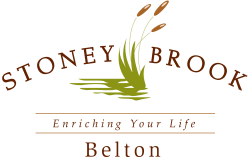Stoney Brook Stress Management Series
PART FOUR: Helping Aging Parents – Game Plan for a Stress-Less Future
Stress can be a natural part of being human, and sadly, older adults are particularly vulnerable to the health and wellness threats it inflicts. Here’s the good news, though: Nobody has to willingly suffer its damaging consequences. Previously in the Stoney Brook Stress Management Series, we showed you why and how stress endangers seniors, the warning signs and symptoms of senior stress, and easy stress-relieving activities that seniors can do. Give them all a read, to fully understand ways to be aware of and combat stress in your loved one, or yourself.
This final installment gives caregivers a game plan for helping their parent or another senior in their lives. By sticking to these carefully-thought-out, preventative strategies, you can minimize anxiety and provide a winning, stress-less future.
Start by tackling “The Talk.”
Nobody ever said that aging – or discussing this tricky topic with your loved ones – would be easy. As a caregiver or child of senior parents, simply having this sensitive conversation could very well be among the toughest things you must do. But while you are beginning to notice and acknowledge their physical and cognitive changes, understand that they probably are, too, and also feel apprehensive about discussing their growing limitations.
For the sake of smoother sailing and brighter horizons in the future, it’s crucial to meet the issues head-on. You can make sense of this new era now, strengthen your conversation skills, become more comfortable with this complex situation, and create your game plan – together.
Address future changes and make some decisions, with the involvement of your loved ones.
Now that you’ve introduced this subject matter and established a comfort level with confronting these topics, you and your family should be ready to ask and begin resolving those thorny questions. Welcome the participation of your parents, as any decisions affect them directly, and you don’t want them to feel that they have no say. Give them time to gradually warm up to the topic and to gain an understanding of the options at hand. If you expect resistance or severe anxiety, add a trusted healthcare professional to the discussion. Just a few topics could be:
- Arranging for power of attorney.
- Managing health care needs.
- Moving into a local independent living assisted living, or memory care community.
Whether these changes are imminent or simply a “what-if” scenario, don’t postpone to the point that you’re deciding an incident or accident forces you into one. Talk soon, so you can gather the important facts, go over the possibilities, and form a plan that decreases your senior parents’ anxiety, as well as your own.
Evaluate just how safe and user-friendly your parents’ home is these days.
Stiff joints. Weakened muscles. Chronic pain. Inflexibility, balance, and vision issues. The list goes on. As we age, it’s inevitable that performing even the simplest tasks becomes demanding, hindered by our dwindling physical abilities. Perhaps, you’ve noticed your loved one struggles to cope with climbing the stairs, using the bathroom without falling, or maneuvering around a too-tight house that can’t accommodate an older occupant, not much less a walker or wheelchair.
Unfortunately, these limitations also spell “trouble,” causing dangerous pain and injury to people who can’t recover as quickly, easily, or fully as they used to – and can even be lethal.
What are your options? Rather than incurring the expense and time of renovations or paying an in-home caregiver, you can consider relocation to a top senior living facility in your area. There, you can keep your parents safe in an accessible environment where they’ll receive around-the-clock supervision and assistance with daily living activities – a stress-free way to age.
Ensure they’re eating healthy, staying hydrated, and moving with regular exercise.
A balanced regimen – featuring a nourishing diet, sufficient water intake, and routine movement – yields a variety of physical, cognitive, and emotional health benefits, including less stress. Seniors who follow such a program will enjoy a great ego boost, too, at a time when they might be wrestling with self-esteem issues.
Note that as one ages, your body’s needs and abilities change. For instance, certain nutritious foods (like fiber) can become harder to digest. In that case, you’d want to help educate your parents and encourage them to eat smaller portions, lightly cook vegetables, and indulge in stews, soups, and shakes. Motivate them to exercise at a comfortable level suitable for seniors – walking, dancing or doing chores at home – or even joining an aerobics class or a yoga, Pilates, or tai chi class with friends.
Boost their social engagement – get them involved in their community.
Extensive research shows the key to health, happiness, and longevity are personal relationships. But, because it’s all too easy and common for seniors to slip into devastating isolation and loneliness, they often endure the unexpected risks of dwindling socialization: mental and physical conditions, such as anxiety, depression, high blood pressure, heart disease, cognitive decline, and many more.
Follow the lead of Stoney Brook’s relationship-centered approach, with which we arrange programs and transportation that connect seniors with their peers and the wider community. Assist your parents with visiting family members, friends, and neighbors, as well as with opportunities to enjoy new and beloved hobbies and interests, charity events, worship services, outings to local shops, restaurants, libraries, parks, movie theaters, and more. Encourage your parents to reap the vital benefits of socializing for seniors, and watch them thrive!
Consistently express your love, patience, and support.
The cornerstone of crafting a positive game plan during a new life stage they might consider strange and possibly even scary: letting them know you are there for them. Remember that relationships with family members and friends play a vital role in establishing mental and emotional well-being.
So, do your best to understand where your parents are coming from. Recognize they might be grieving their perceived loss of capacities, mobility, or independence, among other big changes. Display your compassion and dependability. If you think additional aid is required in this process of adjustment, check in with your loved one’s physician about appropriate clinical intervention and/or recommended ways to handle stress in seniors.
Depend on serene senior living steered by an expert team.
Has the time come to think about moving into senior living, where a professional team can care for their complete well-being, around the clock? When your loved one joins our welcoming residents, the focus will be on benefiting from the many chances each day to experience all of the healthy habits and stress-relieving pursuits advised by our experts.
As a knowledgeable leader, Cardinal Bay has designed its Central Texas assisted living communities and memory care communities to prevent stressors and ensure residents truly flourish. Through a fun, sociable environment and ample, stimulating activities, your loved one can age well – and savor each day to its absolute fullest.
Schedule a complimentary visit to meet us in person and understand our relationship-centered approach firsthand. Plus, subscribe to our blog, a valuable, insightful resource devoted to seniors and their caregivers, and learn more about navigating this next chapter.

